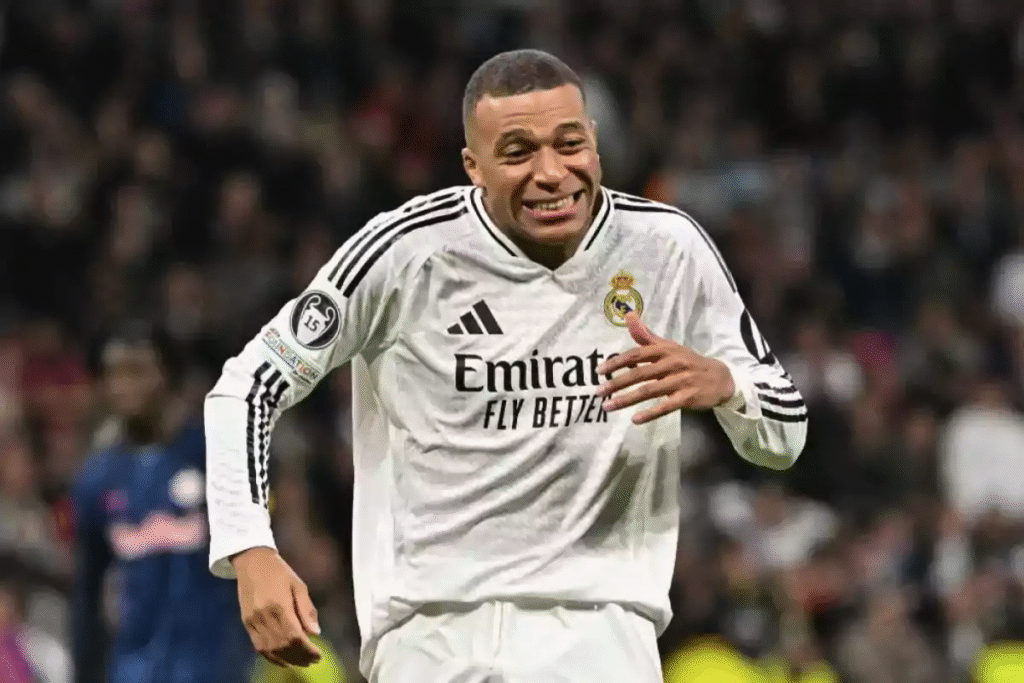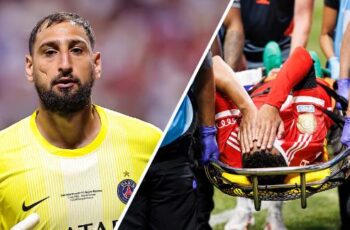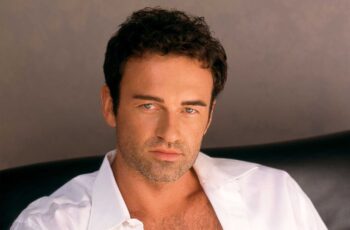The confetti has settled on the hallowed turf of Wembley. The echoes of 90,000 screaming fans have begun to fade into the London night. The silver gleam of the UEFA Champions League trophy, “Ol’ Big Ears,” is now safely stowed on a plane bound for the Spanish capital. But for Real Madrid, and for one man in particular, the feeling is just beginning to sink in. This wasn’t just another victory. This was a coronation.
Kylian Mbappé Lottin, the boy from Bondy who became the prince of Paris, has finally become the king of Madrid.

His first season in the immaculate, mythic white shirt was a year defined by suffocating pressure, astronomical expectations, and a relentless pursuit of the one prize that has always defined Real Madrid’s identity. It all culminated under the Wembley arch against a valiant Borussia Dortmund, in a final that served as the perfect closing chapter to a story years in the making. This wasn’t just a transfer; it was the fulfillment of a prophecy. It was the moment the world’s greatest player joined the world’s greatest club and delivered its most coveted prize.
To understand the magnitude of last month’s triumph, one must first rewind the clock, back to the turbulent summer of 2024, when the longest transfer saga in modern football history finally reached its conclusion.
The End of the Beginning – The Long Road to Madrid
The journey to the Santiago Bernabéu was never a simple one for Kylian Mbappé. For years, it was a “will-he-won’t-he” drama that played out across back pages and social media feeds. Every summer, the whispers grew louder. Florentino Pérez, Real Madrid’s enigmatic president, saw Mbappé not just as a footballer, but as the centerpiece of his next generational project—a Galáctico for the new era.
His final year at Paris Saint-Germain was a masterclass in professionalism under duress. Stripped of the captaincy at times, benched for crucial fixtures as the club flexed its muscles, Mbappé responded the only way he knew how: with goals. He carried a disjointed PSG side on his back, his electric pace and ruthless finishing a stark reminder of the generational talent they were about to lose. Yet, an air of finality hung over the Parc des Princes. Every goal was a farewell gift; every celebration was tinged with the bittersweet knowledge that his heart was already elsewhere.
When the announcement finally came, it wasn’t a shock, but it was seismic. A simple, elegant statement from Real Madrid C.F. confirmed the signing, followed by a post from Mbappé himself, featuring a childhood photo of him beaming in a Madrid tracksuit, surrounded by posters of his idol, Cristiano Ronaldo. The message was clear: this was a homecoming.
His presentation at the newly renovated Santiago Bernabéu was an event unlike any other. Over 80,000 fans flocked to the stadium on a sweltering July afternoon, not for a match, but simply to welcome him. The atmosphere crackled with an energy reserved for the truly special. When Mbappé emerged from the tunnel, dressed in the pristine white kit with no number yet on its back, the roar was deafening.
Florentino Pérez stood beside him, his expression a mixture of pride and vindication. “Today,” he began, his voice resonating through the stadium’s state-of-the-art sound system, “we welcome a footballer who was born to play for Real Madrid. Today, a dream becomes reality. Welcome home, Kylian.”
Mbappé, taking the microphone, addressed the Madridistas in surprisingly proficient Spanish—a gesture that immediately endeared him to the fanbase. “It’s a dream,” he said, his voice thick with emotion. “I am one of you now. Thank you for the wait. ¡Hala Madrid!” The stadium erupted. It was a promise made and a promise received. But with that promise came the unspoken pact: dreams at Real Madrid are paid for in trophies. The biggest of all, the Champions League, was now his primary responsibility.
The Weight of the White Shirt – Adapting to a New Kingdom
The number 9 shirt, left vacant since the departure of the legendary Karim Benzema, was bestowed upon him. It was a symbolic passing of the torch from one French icon to another. But wearing that number, like the crest on the front, comes with a unique, crushing weight. At Real Madrid, you are not just expected to win; you are expected to perform, to entertain, to embody the club’s regal spirit.
The initial transition was not without its challenges. Manager Carlo Ancelotti, the master of managing superstar egos, faced a tantalizing tactical puzzle. How do you fit the world’s best player into a team already boasting talents like Vinícius Júnior, Jude Bellingham, and Rodrygo?
Ancelotti’s solution was fluid and devastating. He deployed Mbappé as a central striker, a true ‘9’, but gave him the freedom to drift into the left channel where he is most dangerous. This created a symbiotic relationship with Vinícius Jr. on the left wing. They became a blur of interchangeable movement, a nightmare for defenders who were forced to track two of the fastest, most direct players on the planet. Behind them, Jude Bellingham continued his evolution into the world’s most complete midfielder, making surging runs into the space vacated by Mbappé.
The first few games of the La Liga season showed flashes of brilliance but also moments of adjustment. There was a palpable sense that the team was learning a new rhythm. The Spanish press, notoriously impatient, began to ask quiet questions after a goalless draw against Real Betis. Was the chemistry right? Was Mbappé pressing enough?
The answer came, as it so often does, in the crucible of El Clásico. At a hostile Camp Nou, with Barcelona taking an early lead, the pressure was immense. It was in this cauldron that the new Madrid was forged. Mbappé, relatively quiet for the first hour, exploded into life. First, he latched onto a through ball from Toni Kroos’ heir, Aurélien Tchouaméni, rounding the keeper to equalize with breathtaking speed. Then, in the 88th minute, he cut inside from the left, played a rapid one-two with Bellingham, and curled an unstoppable shot into the top corner.
He celebrated by pointing to the crest on his shirt, a definitive statement to the world. The adaptation was over. The era of Mbappé had begun. From that point on, he was unstoppable. He finished the La Liga season with 34 goals, winning the Pichichi trophy in his debut year and leading Madrid to the league title with four games to spare. He had conquered Spain. Now, for Europe.
The Path to Wembley – A Champions League Odyssey
The Champions League is Real Madrid’s spiritual home. The club’s entire identity is woven into its 15 (now 16) European Cups. For Mbappé, who had come so agonizingly close with PSG, this was the holy grail.
The group stage was navigated with professional ease. Madrid topped a group containing Inter Milan, PSV Eindhoven, and Celtic, with Mbappé scoring in five of the six matches. But the true test, as always, began in the knockout rounds.
The Round of 16 drew them against Manchester United, a club in resurgence under a new tactical identity. The first leg at Old Trafford was a tense, cagey 1-1 draw. The Bernabéu, for the return leg, was a fortress of noise and belief. It was Mbappé who broke the deadlock, ghosting past a defender before firing a rocket of a shot that nearly tore the net from its moorings. The stadium shuddered with the force of the collective roar. Madrid would go on to win 3-1.
The quarter-finals presented a titanic clash against Bayern Munich. It was a tie steeped in European history, a battle of two continental behemoths. The first leg in Munich was a tactical chess match, ending 2-2, with Mbappé scoring a crucial late equalizer. The second leg was where the myth of the Bernabéu came to life. Bayern took an early lead, silencing the home crowd. For 70 minutes, they defended with disciplined fury, and it looked as though Madrid’s journey might end. But this club has a unique relationship with the impossible. With ten minutes to go, Vinícius Jr. scored a scrappy equalizer. Then, in the 91st minute, as the world held its breath, Mbappé did what he was brought here to do. He picked up the ball on the halfway line, accelerated past two defenders as if they were statues, and slotted the ball past Manuel Neuer. It was a goal of pure, unadulterated individual genius, a moment that justified every cent of his signing-on fee.
The semi-final draw was pure narrative gold, a script written by the football gods: Real Madrid vs. Paris Saint-Germain.
The world’s media went into a frenzy. It was Mbappé versus his past, his old teammates, the club he had left to chase this very dream. The first leg in Madrid was emotionally charged. Mbappé was respectful, but ruthless. He didn’t celebrate when he scored the opening goal in a 2-0 victory, a simple raise of the hand in apology to the traveling PSG fans.
The return leg at the Parc des Princes was an ordeal. He was met with a chorus of deafening whistles every time he touched the ball. Banners depicted him as a traitor, a mercenary. For 90 minutes, he was subjected to a torrent of abuse from the fans who once sang his name. PSG, playing with furious pride, threw everything at Madrid. They scored twice to level the tie on aggregate. The game went to extra time, a nail-biting, leg-sapping affair. Then, in the 115th minute, a Madrid counter-attack. The ball found its way to him. With the entire stadium willing him to fail, he steadied himself and fired the ball into the back of the net. This time, there was no apology. He ran to the corner, a defiant roar on his face, a release of a year’s worth of tension and pressure. He had slain the ghosts of his past to lead his new club to the final.
The Final Showdown – Madrid vs. Dortmund
And so, to Wembley. The opponent was Borussia Dortmund, the sentimental underdog who had captured the hearts of neutrals with a thrilling run to the final. They were a painful reminder of Real Madrid’s own history, having defeated them in the 2013 semi-finals. For Mbappé, it was a chance to exorcise the demons of his own final defeat with PSG in 2020.
The pre-match atmosphere was electric. The sea of yellow and black from the “Yellow Wall” created a stunning visual contrast to the ocean of white. The narrative was set: the ultimate football institution against the ultimate people’s club. The Galácticos vs. the giant-killers.
From the first whistle, Dortmund played with no fear. They pressed high, their energy and intensity disrupting Madrid’s rhythm. For the first thirty minutes, it was Edin Terzić’s side who looked more likely to score. Karim Adeyemi’s pace was causing problems, and Niclas Füllkrug hit the post with a thunderous header. Madrid looked rattled. Mbappé was being double-teamed, suffocated by the tireless work of Julian Ryerson and the veteran presence of Mats Hummels.
At halftime, the score was 0-0, but the momentum was with the Germans. In the dressing room, Carlo Ancelotti’s calm demeanor settled the nerves. He made a small tactical switch, asking Bellingham to play slightly deeper to help control the midfield, allowing Mbappé more space to isolate his markers.
The second half began, and Madrid looked like a different team. They were patient, precise, and probing. The breakthrough came in the 68th minute, from a familiar source. A corner, whipped in with pinpoint accuracy by the timeless Luka Modrić, who had come on as a substitute. It was met by the head of Antonio Rüdiger, who powered the ball into the net. 1-0. The Madrid end of Wembley erupted.
Dortmund, to their credit, did not fold. They pushed for an equalizer, leaving spaces at the back. And for a predator like Kylian Mbappé, space is an invitation to kill the game.
The moment of coronation arrived in the 83rd minute. Dortmund lost possession in Madrid’s half. The ball was quickly fed to Jude Bellingham, who turned and saw the unmistakable blur of white streaking ahead of him. He played a perfectly weighted pass into the channel. Mbappé was onto it in a flash. He took one touch to push it past the last defender, another to steady himself as Gregor Kobel rushed out from the Dortmund goal. The world watched. This was the moment. He opened up his body and, with clinical, cold-blooded precision, slotted the ball into the far corner.
2-0. Game over.
He sprinted towards the corner flag, sliding on his knees in his now-iconic celebration, his arms crossed, a look of serene triumph on his face. His teammates mobbed him. Ancelotti, on the sideline, allowed himself a rare, wide smile. Florentino Pérez, in the director’s box, clapped slowly, a silent acknowledgment of a masterplan perfectly executed. He had done it. Kylian Mbappé had delivered the Champions League to Real Madrid.
The final whistle was met with a roar of pure ecstasy. Mbappé sank to his knees, head in his hands, overcome by the emotion of it all. He was embraced by every one of his teammates. He sought out Dortmund’s players, consoling them with a grace that spoke of his maturity.
When he walked up the Wembley steps to receive his winner’s medal, he paused for a moment, looking out at the sea of white flags and scarves. When the captain, Nacho, lifted the trophy, Mbappé was right beside him, his hands grabbing a piece of the silver, a wide, unadulterated smile of joy on his face. This was it. This was the image that would define an era.
A Legacy Forged, A Prophecy Fulfilled
This victory was more than just the 16th European Cup for Real Madrid. It was the emphatic validation of the biggest sporting project of the decade. It was the confirmation that Kylian Mbappé is not just a generational talent, but a born winner, a player whose ambition is matched only by his ability.
In one season, he has transformed himself. He is no longer the wantaway star of PSG; he is the undisputed king of the Bernabéu. He has embraced the pressure, honored the history, and added his own golden chapter to the club’s unparalleled legacy. He joins the pantheon of legends—Di Stéfano, Puskás, Gento, Raúl, Zidane, Ronaldo—as a player who not only wore the white shirt, but defined it.
The Ballon d’Or now seems an inevitability. It will be the final individual jewel in a season of collective triumph. But for Mbappé and for Real Madrid, this feels not like an ending, but a beginning. With a core of Mbappé, Bellingham, and Vinícius Jr.—all in their prime—a new dynasty is dawning in Madrid.
As he celebrated on the pitch with his family, the journey from the suburbs of Paris to the pinnacle of world football was complete. The boy who dreamed of playing for Real Madrid has now led them to glory. The prophecy has been fulfilled. The king has been crowned. And his reign has only just begun.

